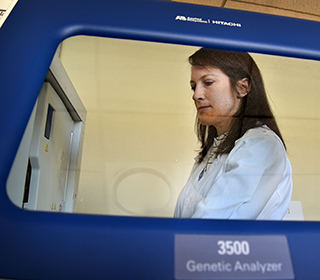Latest News Archive
Please select Category, Year, and then Month to display items
![]()
With the University of the Free State (UFS) academic programme suspended and following guidelines by the UFS Coronavirus (COVID-19/SARS-CoV-2) Task Team to minimise the gathering of people in one place, all UFS libraries will be closed from Friday 20 March to Monday 13 April 2020.
During this time, staff and students will not have any access to the following campus and branch libraries of the UFS Library and Information Services:
• Sasol Library (Bloemfontein Campus)
• Neville Alexander Library (South Campus)
• TK Mopeli Library (Qwaqwa Campus)
• Frik Scott Medical Library (Bloemfontein Campus)
• Music Library (Bloemfontein Campus)
The university community is advised as follows:
• Use Wednesday (18 March) and Thursday (19 March) to borrow books you might need during the long recess. During these two days, students are advised to take precautionary measures and avoid sitting in groups that might compromise their health.
• During this time, all due dates for borrowed material will be automatically extended, no late fines will be charged, and patrons can return material when libraries reopen.
• Please make use of the ‘Ask-a-Librarian’ service for any assistance you might require (go to the UFS Library and Information Services website – click Library Services – click Ask-a-Librarian); OR use the UFS Library social media.
• The UFS Library and Information Services will also be available on a new ‘LiveChat’ service accessible here (listed under Resources – LibGuides). With this service, you can connect ‘live’ with your information librarian.
• All planned activities for the South African Library Week are postponed until further notice.
New Division of Virology to deliver crucial services for HIV diagnosis and resistance testing
2015-12-14

The establishment of a Division of Virology within the Department of Medical Microbiology, under the joint auspices of the UFS and the National Health Laboratory Service (NHLS), reflects the continued growth within Virology. Dr Dominique Goedhals, Head of the Division, says the division will also provide training of undergraduate medical students, medical technologists and technicians, and registrars. |
The newly established Division of Virology at the University of the Free State will be one of only five laboratories in the country to be involved in crucial diagnostic and testing services for HIV viral load monitoring, early infant diagnosis, and HIV resistance testing.
The Virology Diagnostic Laboratory serves as the reference laboratory for all HIV National Priority Programme samples for the Free State and Northern Cape provinces.
Medical staff at the laboratory will provide a 24-hour consultative service, as well as outreach programmes to district laboratories in the Free State and Northern Cape where pathologists are not available.
Dr Dominique Goedhals, Head of the Division of Virology, says this division, under the joint auspices of the UFS and the National Health Laboratory Service (NHLS), reflects the continued growth within Virology.
The division will not only deliver this critical diagnostic service, but will also focus on training and teaching, as well as research.
Teaching and training activities include teaching of undergraduate medical students, medical technologists and technicians, and registrars. The postgraduate science programme has a high output of honours, master’s and doctoral students in Virology. The intern medical scientist programme is also active, with five interns having successfully submitted their portfolios since the programme was implemented in 2010.
Research activities under the Head of Research, Prof Felicity Burt, have also expanded and continue to show increases in publication output and acquisition of grant funding. Established research groups within the Division of Virology focus on vector-borne and zoonotic viruses, human papilloma viruses (HPV), and human immunodeficiency virus (HIV), as well as work with a number of international collaborators.